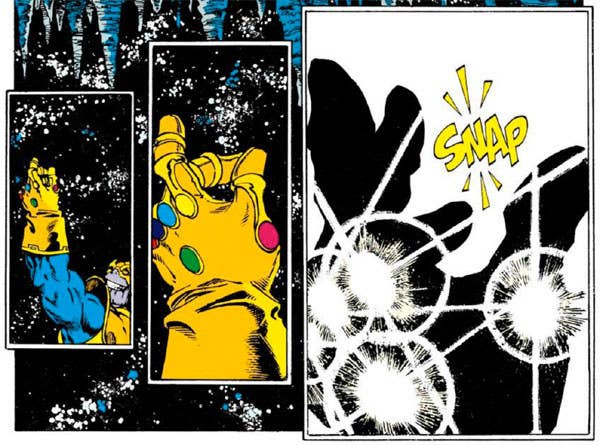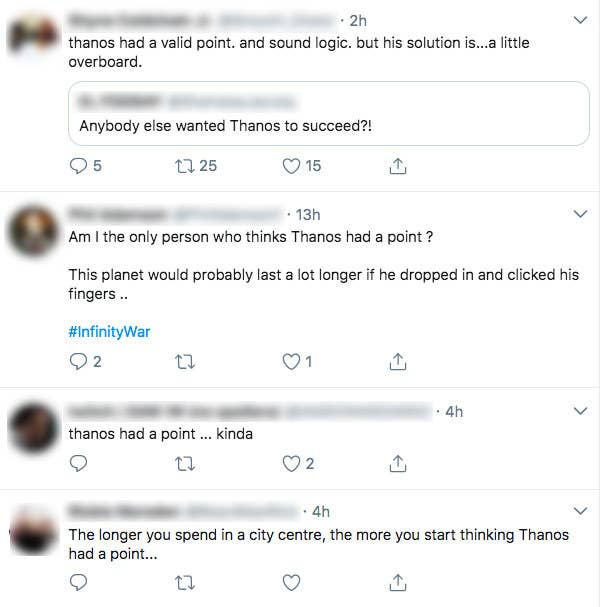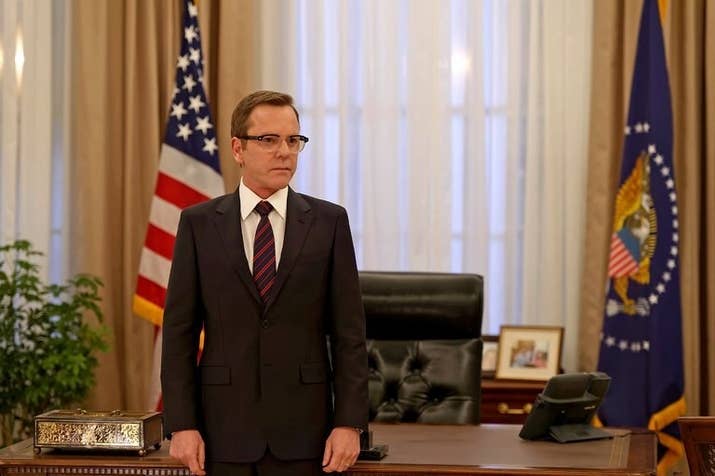FOR THE LOVE OF GOD, INFINITY WAR SPOILERS ARE AHEAD! Like, major ones.

OK, let's talk about that ending, where Thanos snapped his fingers and erased roughly half the universe's population from existence.

(I say "roughly" because he probably left planets he had already "balanced" — like Gamora's home world — with their current populations.)
His reasoning was that planets are overpopulated and need population culls to survive — and of course, people on Twitter felt like he kinda had a good point, because it's Twitter.

But what would actually happen if 50% of Earth's population just...disappeared? Here are a few things that would probably occur:
1. At least some airplanes would crash.
In the end credits scene, we saw a helicopter crash into a building in New York. That would be a possibility for sure, but even scarier is the fact that it's almost guaranteed that one commercial flight would crash. With two pilots on board, there's a 25% chance that they would both disappear. Since there are roughly 5,000 flights in the air at any given time over the United States alone, the chances that every plane in the air would NOT lose both pilots is incredibly small.
What's worse: there's a decent chance that military planes carrying bombs or other explosive payloads could crash as well.
2. TONS of cars would crash.
The number of registered vehicles in the US alone was 253 million back in 2014. Even a very conservative estimate of how many of those would actually be driving at the time Thanos snapped his fingers (which was during broad daylight in both New York and Wakanda, so probably morning and late afternoon, respectively) means that millions of drivers worldwide would disappear from behind the wheel.
3. There would likely be religious fervor.

Churches, synagogues, mosques, and other places of worship would most likely be swarmed after the event, with people thinking that the end times were upon us. And much like in The Leftovers, it's very possible that we would see new religious sects directly related to the event appear and grow in popularity.
4. Patients would likely die during surgeries where the surgeon disappeared.
According to the CDC, there are about 50 million outpatient procedures performed each year in the US alone. Not all of those are surgical, but the ones that are could leave patients open on the table and likely to die.
5. There would be immediate gaps in governments all over the world, potentially leaving exploitable power vacuums.

It would be unlikely that any country would end up like Designated Survivor, but it's possible that several world leaders — along with many members of their immediate cabinets — would disappear. Emergency elections would likely have to be held immediately worldwide, and with so many people gone, we wouldn't have the resources to make sure that all of these elections were fair and honest.
6. Global stock markets would freeze — perhaps for weeks or more — causing immense financial ruin.
The result would almost definitely mean a crash in the global economy, and individual countries would probably be dealing with economic collapse and massive inflation of currency as well. The supply and demand chain would be severely disrupted, likely causing shortages of some products and surpluses of others, inflating and reducing the prices of various goods. Oh, and insurance companies would almost definitely go bankrupt immediately, especially life insurance providers.
7. There would likely be power blackouts in the immediate future and more power grid issues in the longer term.
Depending on how much maintenance different power plants need, some might shut down immediately due to automated safeguards if workers suddenly disappeared. In the longer term, we may have the unique problem of creating too much power for too little demand, as electricity usage would drop dramatically following the disappearance.
OK, but what about population and resource control? Surely there would be some positive results there, right?8. Well, if we look at the epidemic known as the Black Death in the 1300s, we can determine that there ~should~ be some quality of life improvements if governments and economies balance out.
After the plague wiped out as much as 50% of Europe's population, people saw an improved quality of life. Workers would be able to charge more for their labor, there would be more available housing, and the prices of goods would decrease. However, it should be noted that people died off over decades from the plague, whereas in the Thanos scenario, we would lose everyone in an instant. The instability following the event would take a long time to recover from.
9. Following the Black Death, people were generally healthier. But in this scenario, that wouldn't necessarily happen.
The Black Death caused a sort of natural selection, wherein people who were sick, elderly, or otherwise had weak immune systems were most likely to die (although healthy people died in large numbers as well). That meant that the remaining survivors were younger and healthier, and their offspring may have had better chances at surviving future outbreaks as well.
10. Climate change would likely be delayed a bit...but who knows?
There would certainly be an immediate reduction in the amount of deforestation and in the amount of greenhouse gas emissions created by humans. Whether this would alter the planet's mean temperature in a meaningful way quickly enough to halt or reverse global warming is another matter that can't totally be predicted at this point.
11. But after all was said and done...we'd probably be right back where we started in less than 100 years.
In 1900, the world's population was 1.65 billion. The world's current population, 118 years later, is 7.3 billion. If we cut that population in half, we'd still have 3.8 billion people, which is roughly what the world's population was in 1970. Even if the population growth rate stayed the same as it is now, we would probably be back up over 7 billion before the year 2100.
And if you want historical context, you can just look at the population of Europe before, during, and after the Black Death. Losing anywhere from 30 to 50 percent of their population may have slowed growth, but it didn't stop it.

No comments:
Post a Comment